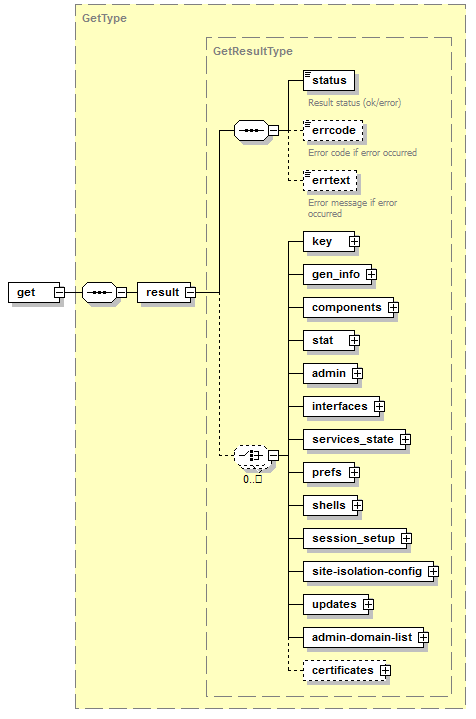This is documentation for Plesk Onyx.
Go to documentation for the latest version, Plesk Obsidian.
Response Packet Structure and Samples
The get node of the response packet is structured as follows:

Note: The interactive schema navigator for all response packets is available here: http://plesk.github.io/api-schemas/1.6.8.0/agent_output.svg.
- The result node is required. It wraps the result of the get
operation. Data type: GetResultType (
server_output.xsd). - The status node is required. It returns the execution status of the get operation. Data type: string. Allowed values: ok | error.
- The errcode node is optional. It returns the error code when the get operation fails. Data type: unsignedInt.
- The errtext node is optional. It returns the error message if the get operation fails. Data type: string.
- Other nodes are optional, a request packet sent to a server
determines if any of them present in the response packet.
- The key node returns a collection of data
describing Plesk license key defining the way Plesk can be used on
the server. Data type: keyType (
plesk_server.xsd). - The gen_info node returns a collection of data
describing general server information which is now presented by
the server name. Data type: serverGenInfoType
(
plesk_server.xsd). - The components node returns a collection of data
describing software components installed on the server and managed
by Plesk. Data type: componentsType (
plesk_server.xsd). - The stat node returns a collection of data
describing in detail Plesk and OS versions, and statistics on the
server resources usage and Plesk logical objects. Data type:
statType (
plesk_server.xsd). - The admin node returns a collection of data describing Plesk
Administrator’s personal information. Data type: adminType
(
plesk_server.xsd). For information on the node structure and response samples, refer to the Administrator Personal Information section. - The interfaces node returns a collection of data
describing network interfaces supported by the server. Data type:
interfacesType (
plesk_server.xsd). - The services_state node returns a collection of
data describing current state of the server services, such as DNS
service, FTP service, Mail service and so on. Data type:
servicesState (
plesk_server.xsd). - The prefs node returns a collection of data describing such
server preferences as settings of traffic usage statistics and
apache restart interval. Data type: serverPrefs
(
plesk_server.xsd). For information on the node structure and response samples, refer to the Server Preferences section. - The shells node returns a collection of data describing shells
installed on the server and available for choosing when
configuring a site’s physical hosting. Data type: ShellsList
(
server_output.xsd). - The session_setup node returns session idle time,
namely, the amount of time a session with Plesk should stay valid
when no actions are performed. Data type: serverSessionSetup
(
plesk_server.xsd). - The site-isolation-config node returns the server
configuration in the site isolation mode. Data type:
siteIsolationConfigOutput (
server_output.xsd). - The admin-domain-list node returns a collection of
data describing domains created in Plesk and belonging to the
Plesk administrator. Data type: domainListOutputType
(
domain_list.xsd). - The certificates node returns a collection of data describing SSL/TLS certificates used to secure Plesk server and mail server.
- The key node returns a collection of data
describing Plesk license key defining the way Plesk can be used on
the server. Data type: keyType (